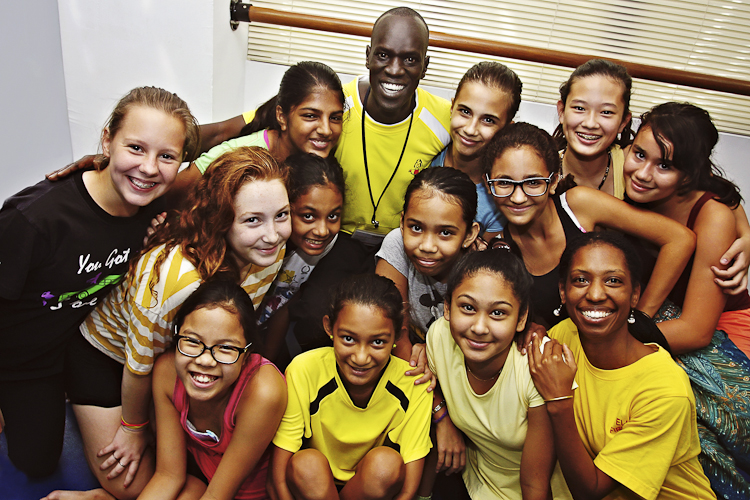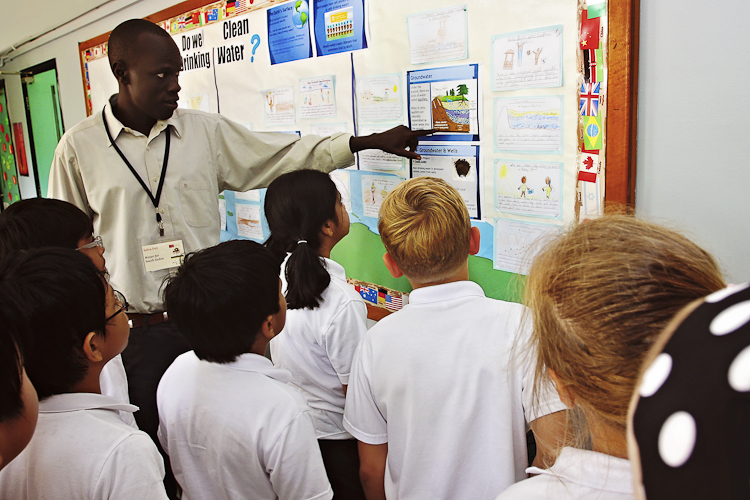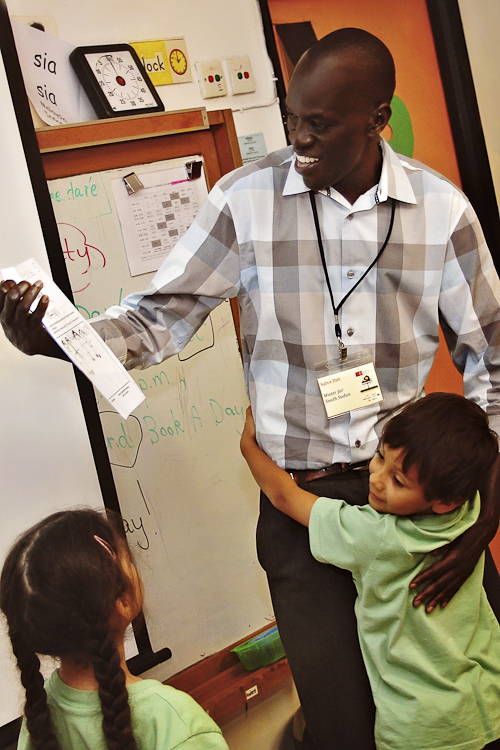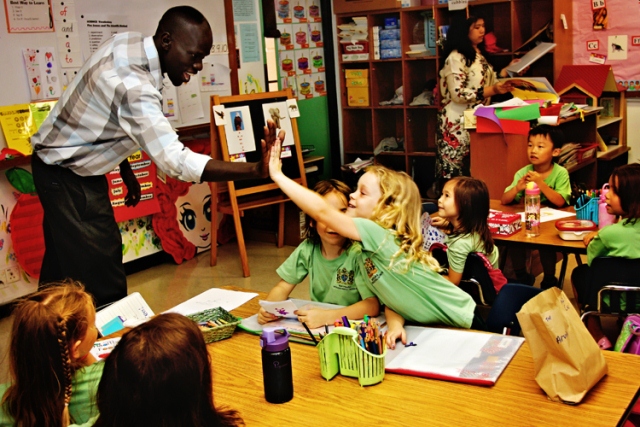
Salva Dut’s inspiring story of persevering and bringing change to his homeland continues. Bryan Wawzenek shares the second instalment of this amazing true story.
Salva couldn’t be more open when conversing with the students. To encourage some reticent students during a Q&A session, his common refrain is, “You can ask any question, I will not be offended, okay?” delivered with a gentle laugh.
See Also: A Sudanese Man’s Perseverance to Bring Water to South Sudan (Part 1)
Grade 7 students ask about his life in South Sudan and he tells them about his hut and his onion farm and his daughters. They ask more about his family, and Salva says that it’s his dream to spend more time with them. “I have not spent one full month at home since I have been married,” he says. “I’m always going around, raising money or building wells. Other lost boys may take over [eventually], so I can spend more time with my family, and be an onion farmer,” he says, smiling.
Although Salva speaks about longing to be home, he also feels the weight of a responsibility to help the people of South Sudan. “I’ve been running this organisation for almost 10 years. I cannot do it all at once,” he says. “Any years that pass and I’m not able to build a well in a village? That means infant babies die, girls get married off and don’t have opportunities. People don’t have clean water.”
.jpg)
But these Q&A sessions result in lighter moments, too. He gets asked about his favorite ice cream flavor (“I don’t like ice cream, it’s too cold!”) and his first reaction to food in the U.S. (“Wow, Americans sure eat a lot!”). He talks about how he and fellow “lost boys” on their way to America were found brushing their teeth with twigs in the ladies bathroom at a German airport. And he tells the amusing, lovely story of how he met his wife, with each sentence punctuated by laughter from the students. But, before the story is over, he brings the subject back to gender equality, discussing the dowry he had to give to his wife’s family. “This is not right,” he says. “Because if people think they are buying you, they think they can treat you any way you want. My wife does not think like this.”
In a middle school dance class, Salva goes from special guest to instructor when the students ask if he can show them any dances specific to his Dinka tribe. Before warning some of the girls that they’ll have to be “boys” because it’s a dance for men and women, he places the dancers in two rows facing each other. He gets them into the appropriate poses and demonstrates the steps before letting them begin. “Boys, you need to impress the girls. Show them you can dance well,” he warns with a smile. “Girls, you need to look at your man. Otherwise he will think you don’t care.”
Both the students and dance teacher Nia Womack-Freeman break out into giggles and Salva can’t quite suppress his laughter at witnessing this demonstration. As it turns out, Womack-Freeman and her students incorporated this traditional move into the dance, “War, Walk, Water,” that they performed as part of the GINsanity (Global Issues Network) conference held at MKIS.

“To me, [Salva’s visit is] a dream come true,” Womack-Freeman says. “Anytime you can meet the person that is the reason behind what you’re doing, it’s a phenomenal opportunity. I would call it ‘living history’ – where you can see exactly what you’re doing and why. It’s amazing.”
“It’s really cool to read a book about a person, then meet him,” says Ali Elsernagawy, a grade seven student at the International School of Kuala Lumpur. “It’s strong that he’s going around and helping people.”
Salva encourages every student that he meets and, occasionally, gives an autograph. If a kid walks by while he’s talking to an adult, Salva pauses to greet and engage with the student before continuing the conversation. It’s clear that he’s making a big impact on these young students in his short time at the school.
“I feel like I want to help people in other countries – make it equal in the world,” says Yannick Oliveres, a grade seven student at MKIS. “I’m hoping to find a way to help other countries like South Sudan.”
After lunch, Sostak asks Salva to stop by a peace and conflict workshop that could benefit from his personal experience. He joins a small group of girls tasked with identifying causes of conflict and possible solutions and oscillates between egging them on and playing devil’s advocate, always with a knowing smile. “Think about your topics … Yes, ‘we can share resources,’ but what if I say I don’t want to? … Oh, she said something good, make sure to write that down!”

Following the activity, Salva is asked to give a short speech on the subject, and delves right into the tribal disputes of South Sudan. The students are rapt. A few minutes later, in the hallway, Salva is congratulated by David Munro, assistant principal of the MKIS middle and high schools. “I can’t believe it,” Munro says, shaking his head and slapping Salva on the back. “We give you a topic and in your head you go to like, ‘speech 2.1,’ and boom. It’s incredible!”
Although Salva told a grade 7 class that his talent is whistling, Munro and other MKIS faculty members marvel at his ability to engage students of all ages and interests. “His willingness to share, to me, was amazing,” says MKIS high school social studies teacher Claudia Fidalgo. “No prep, he would just go right into it. And he was truly open about…anything.”
At GINsanity’s closing assembly, Salva reflected on what he’d seen at the conference and during the week at MKIS: “When I came here, I didn’t expect this beautiful thing. Today, I saw something like magic. The talent I saw here… if I die [tomorrow], these people will take care of this world.”
MKIS middle school student Megan Bureau follows Salva’s grateful words with an electrifying call to action. “We’re not finished,” she declares. “Our next step is not easy, we need to act. We need to remember the words of Salva Dut. He had to act to survive… My challenge to you is: Can you walk the walk?”

As students exited the conference, it was a familiar scene. Salva-mania was in full bloom, with students clamoring for a picture or for an autograph on their GINsanity water bottle. Salva was still smiling. Sostak looked relieved.
Later, the language arts teacher reflected on Salva’s time at MKIS. “I think the positive energy and level of participation was such a brilliant moment for our school community,” Sostak said. “Leading so many willing and engaged participants was a true joy and watching a community unite behind something so integrated and meaningful has been the apex of my teaching career.”
As for what the students gained from Salva’s visit, Sostak stripped it down to one word: “Perspective.”
“I think that our students genuinely walked away from this experience with a greater willingness to see the issues that many people in our world face, specifically in the lives of South Sudanese, some of the poorest people on our planet,” Sostak said. “We gained perspective on our own circumstances with respect to water, education, socio-economic status, peace, and so on. Most importantly, we gained perspective on why not to quit in the face of challenges, great or small. Salva’s perseverance to survive and then start Water for South Sudan is clearly an inspiration to all of us.”
To learn more about Salva’s foundation, Water for South Sudan, please visit the excellent website, www.waterforsouthsudan.org
Source: The Expat January 2014
Read more:
- An Organisation Encouraging Young Ones to Learn by Reading Books
- A Malaysian Journey Towards Sustainable Living
- Building a Greener Malaysia
What are your thoughts on this article? Let us know by commenting below.No registration needed.
"ExpatGo welcomes and encourages comments, input, and divergent opinions. However, we kindly request that you use suitable language in your comments, and refrain from any sort of personal attack, hate speech, or disparaging rhetoric. Comments not in line with this are subject to removal from the site. "




















